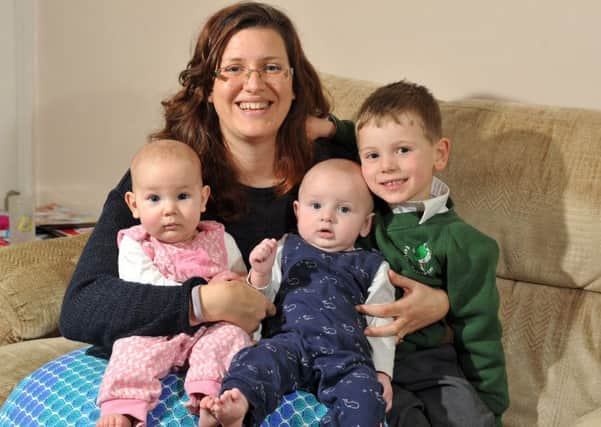The Leeds couple living with the emotional highs and desperate lows of IVF


This article contains affiliate links. We may earn a small commission on items purchased through this article, but that does not affect our editorial judgement.
Dianne Green knows the great emotional highs and desperate lows that come with fertility treatment. Living in Farsley, near Leeds, when she and her husband Martin found they were unable to have children naturally the one free IVF cycle they were entitled to on the NHS ended in an ectopic pregnancy.
A further three cycles, which the couple paid for privately, also failed to complete their family and Dianne admits that in 2011, at the end of what had been a gruelling two years, Martin wanted them both to walk away from any further treatment.
Advertisement
Hide AdAdvertisement
Hide Ad“I persuaded him we should get a second opinion,” says Dianne, who after researching various options contacted CARE Sheffield. “Maybe it was because we went to a private clinic which saw NHS patients, rather than an NHS clinic which saw private patients, but it immediately felt different. It still wasn’t an easy thing to go through. IVF takes its toll on everyone involved, but they did extra tests which revealed I had a problem with an over-active immune system and after one cycle in Sheffield I became pregnant with our son William.
“Because I had miscarried on a previous occasion I didn’t have an immediate sense of elation. I knew just how much could go wrong and I don’t think it was until he was born safely and was in my arms that I really allowed myself to relax.”
The couple waited another four years before paying for a further cycle at CARE Sheffield which in autumn last year resulted in the birth of twins Sophie and Charlie.
Advertisement
Hide AdAdvertisement
Hide Ad“I had just been made redundant and the choice was, do we spend the money on us as a family of three or do we give IVF another shot? Again it was me who persuaded Martin to try again, but it was a big decision. We had the best possible care at Sheffield, but if I have learnt anything over the last few years it is just how inconsistent IVF treatment is.”
The postcode lottery which governs fertility treatment has long been discussed, but securing IVF treatment in some parts of the country may become even harder as Clinical Commissioning Groups, which have the final say in what treatment is available on the NHS, look to balance ever tightening budgets.
Guidelines produced by the National Institute of Clinical Excellence in 2004 recommended that eligible couples should be entitled to three free cycles of IVF on NHS. However, in Yorkshire just three of the 22 offer the full three cycles. Of the rest, 14 have already restricted treatment to just one.
And with a number of CCGs elsewhere in the country already consulting on ending fertility treatment on the NHS entirely there are fears that IVF may become the preserve of a financially comfortable minority.
Advertisement
Hide AdAdvertisement
Hide Ad“Infertility affects one in seven couples in the UK,” says Kate Young of Fertility Fairness. “The World Health Organisation has rightly classified it as a disease and as with any other medical condition it is deserving of treatment.
“The fact is that if it is left untreated, it can result in stress, anxiety, depression and the breakdown of relationships. Yet despite all this evidence, for a number of CCGs fertility treatment is seen as an easy saving and currently 10 per cent of them are consulting on reducing the amount of IVF provision. To ignore the plight of approximately 3.5 million people in the UK who are unable to have children without medical help is not only cruel, it’s also unethical.”